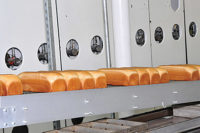That same month, food products in interstate commerce, for which label claims were made, had to comply with the FDA’s new nutritional labeling regulations. Many bakeries and other food processors already complied with this “voluntary” regulation, but a new era of nutrition requirements, better-for-you trends and lower-calorie, lower-fat, vitamin-enriched products and dietary concerns were hitting many food processors with more demands than ever. One baking author called the looming onslaught, “a nutritional tidal wave.”
Frozen dough was being developed by more and more bakeries as supermarkets wanted to sell fresh baked breads in their stores and asked bakeries to supply ready-made dough to “bake off” in-store. Fresh dough wouldn’t last long enough to be distributed to multiple store locations and withstand the shipping conditions, so frozen concepts took shape and continue to evolve today.
In 1974, the House Judiciary Committee recommended that President Richard Nixon be impeached because of the Watergate scandal, but Nixon resigned before the House voted on the articles. Toward the end of the decade, inflation pervaded every sector of the economy. Wage freezes, gas lines and higher taxes became the norm. In 1979, BEMA began donating funds and more recently found other ways to help allied baking organizations. It made its first monetary contribution to AIB, and continues its financial support to the industry today.
Bakery cafes, lower calories and RFID
The Baking Expo was renamed the International Baking Industry Exposition (IBIE) in 1981, and the total number of foreign exhibitors doubled. Foreign attendance comprised more than 20% of all attendees.
In 1982, a small group of franchisees bought the Krispy Kreme Doughnut Co. from Beatrice Foods, which purchased it in 1976—three years after founder Vernon Rudolph—passed away—and a renewed focus on the hot donut became a priority. This allowed Krispy Kreme to expand outside of the Southeast.
In 1984, Boudin Bakery discontinued its wholesale grocery business and focused heavily on the development of its Bakery-Cafés, which remain a hit today. In 1999, Boudin marked its 150th anniversary. The bakers continue to hand craft each loaf, using a portion of the original mother dough to start each day’s batch of sourdough bread. In 1995, Interstate Brands Corp. acquired the Continental Baking Co., and the “Remember the Wonder” ad campaign reminded consumers that Wonder Bread, one of the nation’s softest, freshest, most fun bread products, was also nutritious.
A reduced-calorie Wonder Bread was launched in 1986. The bread was made with fibers from natural sources. Wonder Light is the company’s most successful new product in decades. Lewis Bakeries removed all trans-fats from its entire line of bread and buns in 1987, and considered itself the first in the United States baking industry to do so. This was achieved after discovering detrimental effects of the consumption of trans-fats on the population. Lewis found this out decades before the general population became concerned about the effects of trans-fats. It also launched Healthy Life Bread fat-free, reduced-calorie and high-fiber bread in 1991. Oddly enough, that was a time when many wholesale bakers were starting to discover artisan products.

















